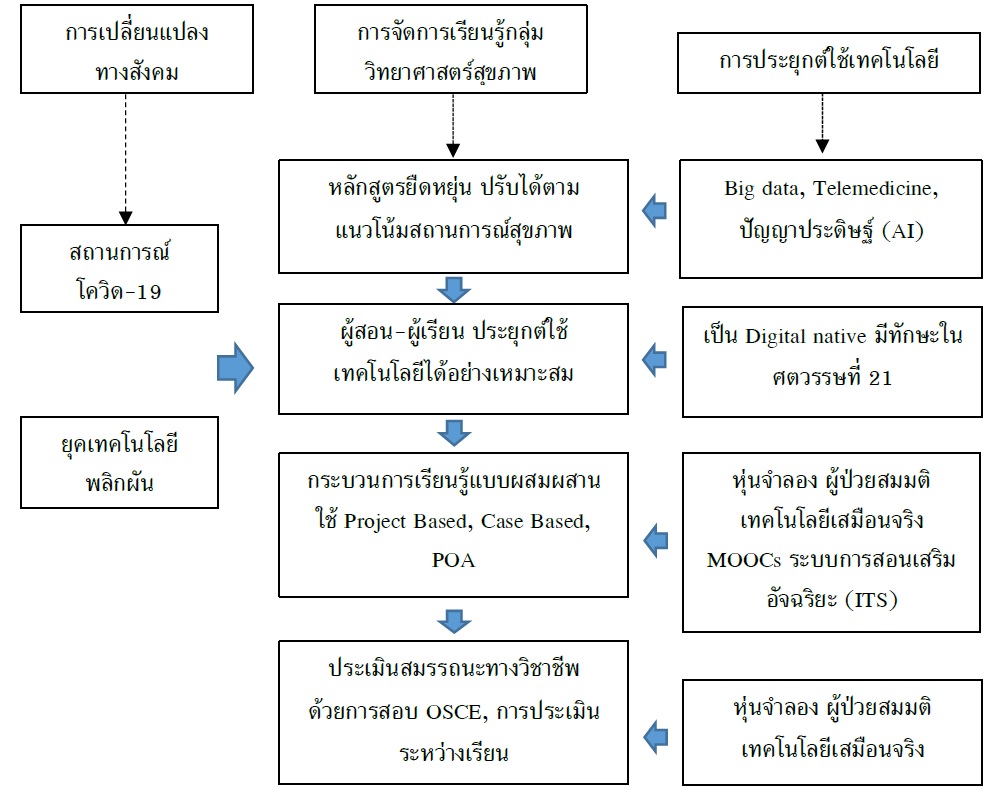A Direction of Health Science Learning Management in Disruptive Technology
Keywords:
Health science, Learning, The COVID-19 pandemic, Disruptive technologyAbstract
The purpose of this study is to suggest the direction enhancing the learning of health science in the time of disruptive technology. Since the curriculums in health science are considered to be professional programs, it is crucial for learners to practice systematic thinking, and clinical skills, including hands skills. These practices are normally taught in classes and as first-hand experience. However, regarding the COVID-19 pandemic, the curriculums must arrange the teaching and learning to comply with COVID-19 prevention measures. As a result, educational institutions and curriculums have become more aware of the use of technology in teaching and learning. Furthermore, with the advancement of technology in this disruptive technology era which affects the global society in all aspects, this is an opportunity to use modern technology to enhance the efficiency of health science learning. The study suggested the direction of health science learning management in disruptive technology, by focusing on competency-based learning including curriculum, learning process instructional media, and learning evaluation. This study also provides the guidelines to develop the learning of health science for the situation with limitations and to enhance the efficiency of teaching and learning in order to accomplish the expected outcomes of the curriculums.
References
World Economic Forum. 4 ways COVID-19 could change how we educate future generations [Internet]. 2020 [cited 2021 Sep 24]. Available From https://www.weforum.org/agenda/2020/03/4-ways-covid-19-education-future-generations/
สิริพร อินทสนธิ์. โควิด-19: กับการเรียนการสอนออนไลน์ กรณีศึกษ: รายวิชาการเขียนโปรแกรมเว็บ. วารสารวิทยาการจัดการปริทัศน์ 2563;22:203-13
ชัชชญา พีระธรณิศร. ความท้าทายการจัดการศึกษาในยุค Disruptive Change ของผู้บริหารสถานศึกษา. ศึกษาศาสตร์สาร มหาวิทยาลัย เชียงใหม่ 2563;4:126-39.
เคลาส์ ชวาบ และ นิโคลัส เดวิส. ทางรอดในโลกใบใหม่แห่งการปฏิวัติอุตสาหกรรมครั้งที่สี่.กรุงเทพฯ: อมรินทร์ How To; 2561.
ปทุมพร เปียถนอม. ภาวะผู้นำทางการศึกษายุคการแทนที่ด้วยสิ่งใหม่กับทิศทางการศึกษาไทย. วารสารมนุษยศาสตร์และสังคมศาสตร์ มหาวิทยาลัยนครพนม 2563;10:115-23.
วิชัย วงษ์ใหญ่ และ มารุต พัฒผล. การจัดการเรียนรู้ในยุค Disruptive Innovation. กรุงเทพฯ: ศูนย์ผู้นำนวัตกรรมหลักสูตรและการเรียน; 2562.
Quirk M, Chumley H. The adaptive medical curriculum: A model for continuous improvement. Medical Teacher 2018;40(8): 786-90.
เทื้อน ทองแก้ว. การออกแบบการศึกษาในชีวิตวิถีใหม่: ผลกระทบจากการแพร่ระบาด COVID-19. วารสารคุรุสภาวิทยาจารย์ 2563;1:1-10.
Pelz B. (My) Three principles of effective online pedagogy. Journal of Asynchronous Learning Networks 2021;14(1):103-16.
Uruthiralingam U, Rea PM. Augmented and virtual reality in anatomical education-A systematic review. Advances in Experimental Medicine and Biology 2020;1235:89-101.
Stromberga Z, Phelps C, Smith J, Moro C. Teaching with disruptive technology: The use of augmented, virtual, and mixed reality (holoLens) for disease education. Advances in Experimental Medicine and Biology 2021; 1317:147-62.
ดนัย อังควัฒนวิทย์. Simulation การเรียนการสอนรูปแบบใหม่ในโรงเรียนแพทย์ [อินเทอร์เน็ต]. 2562 [เข้าถึงเมื่อ 5 ธันวาคม 2564]; เข้าถึงได้จาก:https://med.mahidol.ac.th/th/knowledge_awareness_health/08jan2020-1639
ตรีภพ เลิศบรรณพงษ์. การจัดการเรียนการสอนแพทยศาสตร์ด้วยสถานการณ์จำลอง (Simulation Based Medical Education). เวชบันทึกศิริราช 2558;8:39-46.
สำนักงานวิจัยและพัฒนากำลังคนด้านสุขภาพ. โรงเรียนแพทย์ในยุค Disruptive Technology [อินเทอร์เน็ต]. 2562 [เข้าถึงเมื่อ 5 ธันวาคม 2564]; เข้าถึงได้จาก: https://hrdo.org/disruptive-technology/
Moran J, Briscoe G, Peglow S. Current technology in advancing medical education: perspectives for learning and providing care. Academic Psychiatry 2018;42(6):796-9.
Papapanou M, Routsi E, Tsamakis K, Fotis L, Marinos G, Lidoriki I, et al. Medical education challenges and innovations during COVID-19 pandemic. Postgraduate Medical Journal 2022; 98:321–7.
Wartman SA, Combs D. Reimagining medical education in the age of AI. AMA Journal Ethics 2019;21(2):E146-152.
วรากรณ์ สามโกเศศ. รู้จัก Disruptive Technologies [อินเทอร์เน็ต]. 2559 [เข้าถึงเมื่อ 5 ธันวาคม 2564]. เข้าถึงได้จาก: https://www.bangkokbiznews.com/blog/detail/639505(2559).

Downloads
Published
Issue
Section
License
บทความทุกบทความที่ตีพิมพ์ในวารสารการพัฒนางานประจำสู่งานวิจัย (JPR2R) ถือว่าเป็นลิขสิทธิ์ของวารสารการพัฒนางานประจำสู่งานวิจัย คณะสิ่งแวดล้อมและทรัพยากรศาสตร์ มหาวิทยาลัยมหิดล





